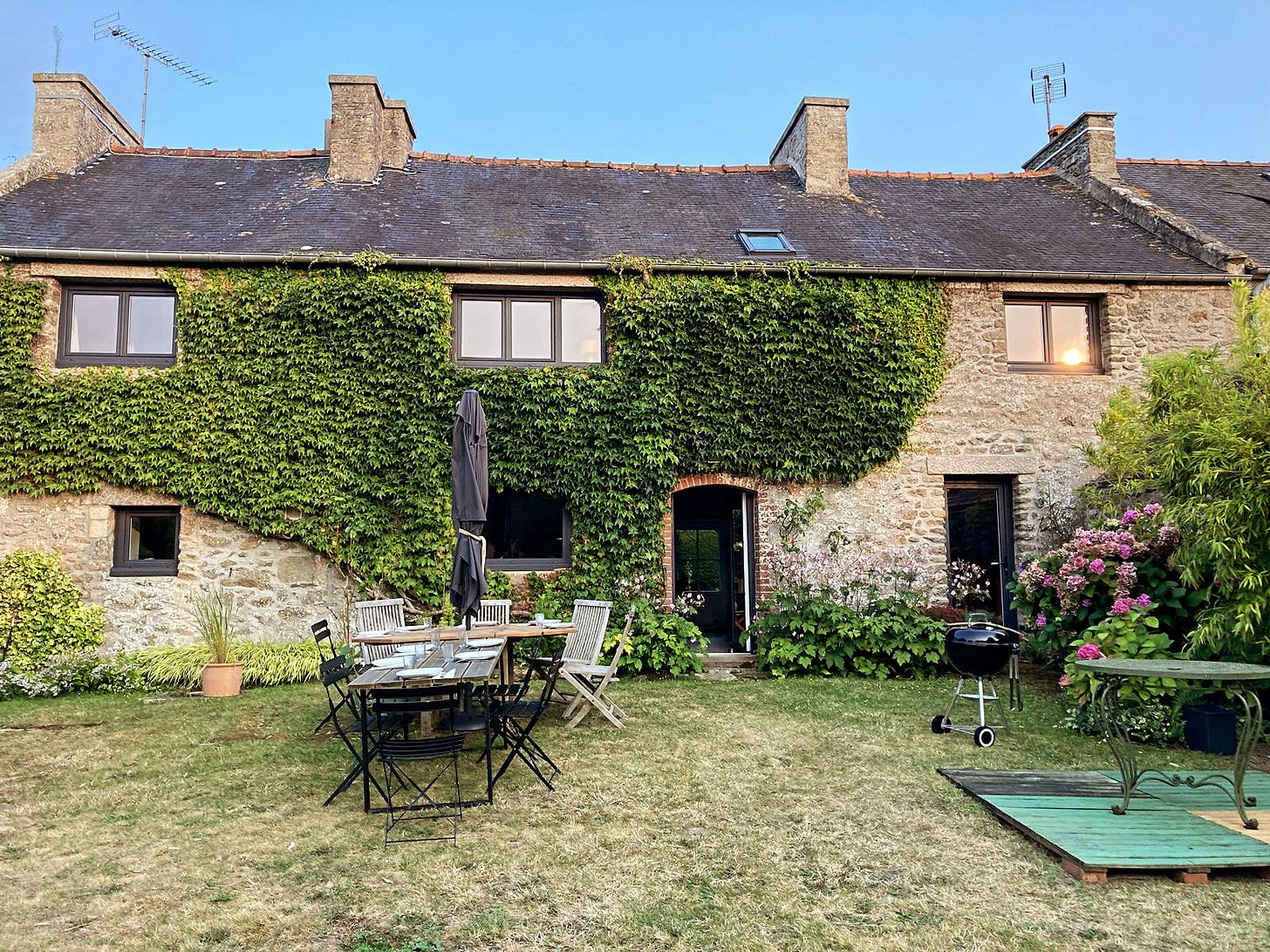The waiting season
Two weeks ago, I sent my agent my new novel. Here's what I'm doing while I wait for her feedback.
Every August, my French husband returns to the motherland to spend time with his family. Rather famously, the French don’t work in August—August and then some. When I lived and worked in Paris, I got five weeks of paid vacation plus two monthly “R&R” days I could take at my discretion. If I didn’t use them, the days were tacked on my vacation. If you’re wondering why I ever left France—you’re in good company: I often wonder, too.
I usually accompany my husband on these August journeys, but unlike the French—I have to work while I’m abroad. I do so from a bedroom in my mother-in-law’s stone cottage in Brittany that has a glorious view of a sheep farm. I have finished many a draft while gazing at the livestock, wondering if I’ll have the courage, after writing, to swim in the cold sea.
This year has been a tough one. Between health setbacks, family snarls and a crushing workload, I needed a real vacation this August: an indecent stretch of time with my phone off and my computer powered down. Accordingly, I vowed to finish the novel I’ve been working on before going abroad so that I could have—not a month of vacation like the Frenchies—but something pretty close.
I wasn’t sure I’d be able to achieve my goal because it took me longer than I anticipated to recover from several surgeries I had this spring, which threw me off my timeline. To catch up, I busted my ass in July and managed to type “The End” on my novel in the airplane before we left the tarmac in Philly, so technically I did finish before we went abroad. I took a photo of my computer in the narrow airplane seat and was so excited to share it, only to realize that in a recent bout of organizing my phone’s data, I deleted the image.
In its place, I send you flowers: this is the cottage we stayed at in the Cotswolds in England before heading to France.
The end…isn’t the end
As any writer knows, typing “The End” is both an act of denial and self-preservation. In publishing land, “The End” marks the beginning. I have sent my manuscript to my agent, but I’m far from done.
From here on out, my agent will have to read the entire manuscript, get notes back to me from which I’ll make revisions, and then we’ll tread through the badlands of submission, where she’ll try and sell my novel to an editor. Generally, writers at my career-level write under contract, meaning that they sell a book idea to an editor on what’s known as “a partial” if it’s a novel (about three chapters or so, plus a general outline of the book) or a book proposal if it’s a memoir or nonfiction. I have worked under contract for a novel once in my life, and while it was financially rewarding (you get an advance on a book you haven’t written!), creatively, it was daunting.
The thing is, when I sold my second novel shortly after my debut published, I didn’t know yet how I functioned as an author. I’m deliberately using the word “author” here and not “writer.” “Writer” is the swashbuckling, feverish part of writing: making up stories, deciding the order in which to tell those stories. It’s the author who has to deal with deadlines, budgets, pre-sales, big sales, no sales, paper supply issues, bad reviews, tepid reviews, Amazon trolls and all the rest. Published authors are forever going to be shadowed by their sales records. Good sales, bad sales: honestly, both records create pressure, and pressure is hard to produce good art beneath.
What I’ve discovered since getting a book deal off a partial ten years ago is that I need two years to write a novel. The first year is spent writing the wrong story. The second year is spent writing and revising the correct one. Back when I sold my second book, I didn’t know this about myself, so I giddily accepted a contract that only gave me a year to write the book, which resulted in me having a flat-out existential crisis because I’d never made art supervised before.
Now that I know more about my process—especially how messy my work is at the beginning—I try to keep enough savings to write books outside of contracts. That way, I can take the time I need to make mistakes and course-correct without anyone looking over my shoulder as I type and get things wrong. When we present the book, it is the book I wanted to write. A project without compromise. But the journey there is long.
After typing “The End” on my flight to London (we went to England for a week before heading to France to avoid the hullaballoo of the Paris Olympics) I took an edible, watched a documentary (“Closed for Storm”) about an amusement park outside of New Orleans that has been abandoned for 19 years and tried to get some sleep. We had two days in London and four days in the almost perversely glorious Cotswolds and I kept my computer and my phone off for the duration of that trip.
When we got to Brittany, I allowed myself three days of further basking and on a Thursday, I returned to work. I read over the last thirty percent of my novel, revised what I could as I went and made notes for deeper changes. After making those revisions, I read the manuscript from the beginning. I’ve been revising the first half of this book since January, and my agent has weighed in on it, so I knew the beginning was tight. Mostly I was looking for issues of continuity (names changing halfway through, plot points that got abandoned—consistency issues of this sort) and also pleasure: the stakes I set up in the beginning, did they feel earned, genuine and satisfying by the end?
I revised what felt cheap, I cut what felt superfluous. I texted my agent as to when she could expect the draft. Then I read the entire manuscript again. On August 12th, I emailed the finished novel to my agent.
The waiting game begins
Whether you are waiting to hear from agents, editors, or a panelist of judges: there’s no other way to put this. Waiting is the worst.
What follows is a checklist of what I’m doing (and not doing) as I wait to hear what my agent thinks of the book I’ve sent.
I don’t know how helpful you’ll find this information, but my hope is that if you’re also in the waiting room, my confessions might make you feel less vulnerable and alone?
The 6 things I’m doing while waiting to hear back from my agent about the big-ass book I sent :

I got sad. I don’t know if I’m alone in this, but I get heavyhearted when I finish a full draft of a book. Partly it’s from burnout derived from working super hard on one concentrated thing; partly it’s because I know how much work waits around the corner; but mostly, it’s because I’m sending a private part of myself out for inspection and judgement. Turning the private into something public isn’t easy for anyone.




